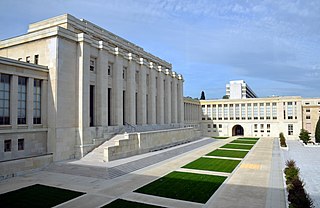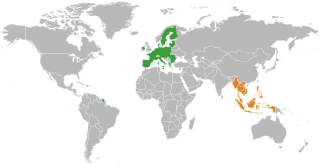In international relations, intergovernmentalism treats states as the primary actors in the integration process. Intergovernmentalist approaches claim to be able to explain both periods of radical change in the European Union because of converging governmental preferences and periods of inertia because of diverging national interests. Intergovernmentalism is distinguishable from realism and neorealism because of its recognition of the significance of institutionalisation in international politics and the impact of domestic politics upon governmental preferences.

The United Nations Economic Commission for Europe is one of the five regional commissions under the jurisdiction of the United Nations Economic and Social Council. It was established in order to promote economic cooperation and integrations among its member States.
Neofunctionalism is a theory of regional integration which downplays globalisation and reintroduces territory into its governance. Neofunctionalism is often regarded as the first European integration theory developed by Ernst B. Haas in 1958 as part of his Ph.D. research on the European Coal and Steel Community. Neofunctionalism seeks to explain the European integration process and why states accept to become a part of supranational organization. Jean Monnet's approach to European integration, which aimed at integrating individual sectors in hopes of achieving spillover effects to further the process of integration, is said to have followed the neofunctional school's tack.

Europe, the westernmost portion of Eurasia—is often divided into regions and subregions based on geographical, cultural or historical criteria. Many European structures currently exist. Some are cultural, economic, or political; examples include the Council of Europe, the European Broadcasting Union with the Eurovision Song Contest, and the European Olympic Committees with the European Games. Russia dominates the continent by both area and population; spanning roughly 40% of its total landmass, with over 15% of its total population.
European integration is the process of industrial, economic, political, legal, social and cultural integration of states wholly or partially in Europe or nearby. European integration has primarily come about through the European Union and its policies.
A supranational union is a type of multinational political union where negotiated power is delegated to an authority by governments of member nation-states.

The Organization of the Black Sea Economic Cooperation (BSEC) is a regional international organization focusing on multilateral political and economic initiatives aimed at fostering cooperation, peace, stability and prosperity in the Black Sea region. It traces its origin to 25 June 1992, when Turkish President Turgut Özal and leaders of ten other countries gathered in Istanbul and signed the Summit Declaration and the "Bosphorus Statement". BSEC Headquarters – the Permanent International Secretariat of the Organization of the Black Sea Economic Cooperation – was established in March 1994, also in Istanbul.

Regional Integration is a process in which neighboring countries enter into an agreement in order to upgrade cooperation through common institutions and rules. The objectives of the agreement could range from economic to political to environmental, although it has typically taken the form of a political economy initiative where commercial interests are the focus for achieving broader socio-political and security objectives, as defined by national governments. Regional integration has been organized either via supranational institutional structures or through intergovernmental decision-making, or a combination of both.
Functionalism is a theory of international relations that arose during the interwar period principally from the strong concern about the obsolescence of the state as a form of social organization. Rather than the self-interest of nation states that realists see as a motivating factor, functionalists focus on common interests and needs shared by states in a process of global integration triggered by the erosion of state sovereignty and the increasing weight of knowledge and hence of scientists and experts in the process of policy-making. Its roots can be traced back to the liberal/idealist tradition that started with Kant and goes as far as Woodrow Wilson's "Fourteen Points" speech.
Multi-level governance is a term used to describe the way power is spread vertically between many levels of government and horizontally across multiple quasi-government and non-governmental organizations and actors. This situation develops because many countries have multiple levels of government including local, regional, state, national or federal, and many other organisations with interests in policy decisions and outcomes. International governance also operates based on multi-level governance principles. Multi-level governance can be distinguished from multi-level government which is when different levels of government share or transfer responsibility amongst each other. Whereas multi-level governance analyses the relationship of different state levels and interaction with different types of actors.'

A security community is a region in which a large-scale use of violence has become very unlikely or even unthinkable. The concept of a security community is related to a group of states that enjoy relations of dependable expectations of a peace. The term was coined by the prominent political scientist Karl Deutsch in 1957. In their seminal work Political Community and the North Atlantic Area: International Organization in the Light of Historical Experience, Deutsch and his collaborators defined a security community as "a group of people" believing "that they have come to agreement on at least this one point: that common social problems must and can be resolved by processes of 'peaceful change'". Peaceful change was defined as "the resolution of social problems, normally by institutionalized procedures, without resort to large-scale physical force". People in a security community are also bound by the "sense of community", the mutual sympathy, trust, and common interests.

Regional organizations (ROs) are, in a sense, international organizations (IOs), as they incorporate international membership and encompass geopolitical entities that operationally transcend a single nation state. However, their membership is characterized by boundaries and demarcations characteristic to a defined and unique geography, such as continents, or geopolitics, such as economic blocs. They have been established to foster cooperation and political and economic integration or dialogue among states or entities within a restrictive geographical or geopolitical boundary. They both reflect common patterns of development and history that have been fostered since the end of World War II as well as the fragmentation inherent in globalization, which is why their institutional characteristics vary from loose cooperation to formal regional integration. Most ROs tend to work alongside well-established multilateral organizations such as the United Nations. While in many instances a regional organization is simply referred to as an international organization, in many others it makes sense to use the term regional organization to stress the more limited scope of a particular membership.

An international organization which includes Intergovernmental organization and International non-governmental organization or International non-profit organization are a stable set of norms and rules meant to govern the behavior of states and other actors in the international system. Organizations may be established by a treaty or be an instrument governed by international law and possessing its own legal personality, such as the United Nations, the World Health Organization and NATO. International organizations are composed of primarily member states, but may also include other entities, such as other international organizations. Additionally, entities may hold observer status.

The ASEAN–European Union relations refers to bilateral foreign relations between the two organizations, the European Union (EU) and the Association of Southeast Asian Nations (ASEAN). EU and ASEAN have been interacting with each other on the economic, trade and political levels for more than four decades. The partnership between the EU and ASEAN dates back to 1972 when the EU became ASEAN's first formal dialogue partner.

The United Nations University Institute on Comparative Regional Integration Studies (UNU-CRIS) is a Research and Training Institute of the United Nations University (UNU). Based in Bruges, (Belgium) since 2001, UNU-CRIS specializes in the comparative study of regional integration and the provision of global and regional public goods, including environmental stability, poverty reduction, peace and justice.
The integration of Latin America has a history going back to Spanish American and Brazilian independence, when there was discussion of creating a regional state or confederation of Latin American nations to protect the area's newly won autonomy. After several projects failed, the issue was not taken up again until the late 19th century, but now centered on the issue of international trade and with a sense of pan-Americanism, owing to the United States of America taking a leading role in the project. The idea of granting these organizations a primarily political purpose did not become prominent again until the post-World War II period, which saw both the start of the Cold War and a climate of international cooperation that led to the creation of institutions such as the United Nations. It would not be until the mid-20th century that uniquely Latin American organizations were created.

Policies advocating Middle East economic integration aim to bring about peace, stability, and prosperity in the Middle East, which they believe can only be sustained over the long run via regional economic cooperation.

The Baltic Sea Parliamentary Conference (BSPC) was established in 1991 as a forum for political dialogue between parliamentarians from the Baltic Sea Region. BSPC aims at raising awareness and opinion on issues of current political interest and relevance for the Baltic Sea Region. It promotes and drives various initiatives and efforts to support a sustainable environmental, social and economic development of the Baltic Sea Region. It strives at enhancing the visibility of the Baltic Sea Region and its issues in a wider European context.









